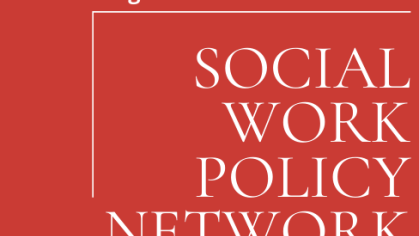By Shreya Gupta
We recently had the opportunity to speak with MSW student Kathyna Bonheur about her virtual field placement working with Dr. Ronald Quincy at the Center of Leadership at the Rutgers Edward J. Bloustein School of Planning and Public Policy at Rutgers. Read her story in honor of Social Work Month.
Can you share a bit about your background at Rutgers SSW?
I am a third-year MSW student at the Rutgers School of Social Work. I was attracted to the field of social work through my immense passion for helping others, especially children, and completed my undergraduate studies in Family and Child Studies from Montclair State University in 2018. I have an extensive background working with youth, including roles as an assistant teacher at a children's day care, an aftercare aide, and a summer camp counselor. I am also involved with other volunteer activities, such as distributing nonperishable food products to families and organizing drives to collect essential items for members of the Newark community. Currently, I volunteer at a church as a Sunday School teacher and provide virtual lessons to children.
Why did you choose to pursue the MAP specialization?
I wanted to understand the ways in which management and policy shape the field of social work, as well as learn about it at the macro level. Pursuing the MAP specialization will build my efficiency as a social worker, especially because I am someone who enjoys the process of planning and actively engaging with others.
How were you connected with the Center of Leadership at the Rutgers Edward J. Bloustein School of Planning and Public Policy?
I shared my passion and experiences working with children with my field coordinator, Mariann Bischoff, and she thought it would be an excellent idea to complete an out-of-the-box field placement. I was presented with the opportunity to work with Dr. Ronald Quincy at the Center of Leadership in the Rutgers Edward J. Bloustein School of Planning and Public Policy. When he told me about the projects he is involved with, I was excited and intrigued, and wanted to explore it more.
What does your work at the field placement/internship consist of?
My internship with Dr. Quincy consists of many responsibilities. Currently, through the freshman seminar at Bloustein, I am working with others to raise funds to expand a library in Alego, Kenya, which is the hometown of former President Obama’s paternal grandmother. In collaboration with a coordinator in Nairobi, we are assessing the objectives, timelines, and finances that are essential for this project. We have also created a GoFundMe page to encourage others to donate to this cause. Later this month, I will be meeting with others to discuss my role in a project based in Puerto Rico.
Dr. Quincy is involved with several international humanitarian projects, but due to the ongoing COVID-19 pandemic, they are on currently on hold. When he mentioned that alumni traveled to Haiti to provide assistance during the devastating earthquake, I was touched because I am Haitian American. It is incredible that as social workers we can make an impact in the lives of a diverse population of people.
My field education experience will allow me to network with knowledgeable people across multiple disciplines, develop my administrative skills, and compile a variety of documents for presentation.
What is it like navigating your field placement virtually during the COVID-19 pandemic?
Communication with Dr. Quincy and his associates is solely virtual via Zoom calls and e-mails. However, our class has been able to channel our creativity by forging new ways to connect remotely. Prior to the pandemic, Dr. Quincy traveled to various locations with his students, but his travels have been put on hold. I am hoping that post-COVID-19 we are able to expand our reach in person and physically be involved with the sites where we conduct our projects.
What are some of your hopes for the field social work?
I hope to clear the commonly-held misconception that social workers are limited to work opportunities in child welfare and government affairs. Social workers are involved in a wide variety of fields, such as mental health, addictions, housing, healthcare, schools, and beyond, and I want people to recognize our diverse roles.



